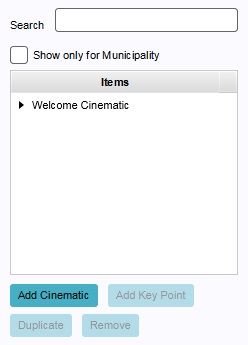Cinematic: Difference between revisions
No edit summary |
|||
| Line 16: | Line 16: | ||
==Creating and editing cinematics== | ==Creating and editing cinematics== | ||
{{editor ribbon|header=Animations|bar=Cinematics}} | |||
In the editor, it is possible to create, duplicate, edit and delete cinematics in a project. It is also possible to create and remove key points to and from a cinematic. | |||
===Creating or removing cinematics=== | |||
{{editor ribbon|header=Animations|bar=Cinematics}} | |||
[[File:Cinematics-left.jpg|frame|left|The left panel allows you to select cinematics.]] | |||
{{Editor steps|title=create a new cinematic|Select "Animations" in the ribbon header.|Select "Cinematics" in the ribbon bar.|Select "Add cinematic" in the [[editor#Left_Panel|left panel]].}} | |||
{{Editor steps|title=duplicate an existing cinematic|Select "Animations" in the ribbon header.|Select "Cinematics" in the ribbon bar.|Select the existing cinematic you wish to duplicate.|Select "Duplicate" in the [[editor#Left_Panel|left panel]].}} | |||
{{Editor steps|title=remove an existing upgrade type|Select "Animations" in the ribbon header.|Select "Cinematics" in the ribbon bar.|Select the cinematic you wish to remove.|Select "Remove" in the [[editor#Left_Panel|left panel]].}} | |||
<br clear=all> | |||
Revision as of 12:07, 13 August 2015
Cinematic
Cinematic refers to something which relates to, or is itself, an animation or movie. Something which is cinematic is generally non-interactive.
How do cinematics relate to the Tygron Engine
In the Tygron Engine, a cinematic is an animation through the 3D world. During a cinematic, the user is no longer in control of their camera. Instead, the camera moves automatically between key locations. The user is also unable to take any actions, until the cinematic is ended. When the cinematic ends, the camera is places back into a normal position, directed at the last key location's camera direction.
The cinematic also displays text to the user when necessary. This can happen in two ways. The text can be displayed as a subtitle, while the camera continues to move in the cinematic. Alternatively, displaying the text can pause the cinematic, until the user confirms they wish to continue.
When to use cinematics
Cinematics are generally used for exposition to the user. When it is necessary to provide information to a user, or to direct their attention to a specific predefined location in the 3D world, this can be done using a cinematic. Because a cinematic takes away the user's ability to move the camera themselves, and to take actions, a cinematic is best used for vital information which only has to be provided once. An example of this is an introduction to the area at the start of the session.
Coupling cinematics to stakeholders
While editing, it is possible to attach a cinematic to a stakeholder for a specific level. This means that when the level starts, the user in the role of that stakeholder will see the provided cinematic.
Creating and editing cinematics
Template:Editor ribbon In the editor, it is possible to create, duplicate, edit and delete cinematics in a project. It is also possible to create and remove key points to and from a cinematic.
Creating or removing cinematics
- Select "Animations" in the ribbon header.
- Select "Cinematics" in the ribbon bar.
- Select "Add cinematic" in the left panel.
- Select "Animations" in the ribbon header.
- Select "Cinematics" in the ribbon bar.
- Select the existing cinematic you wish to duplicate.
- Select "Duplicate" in the left panel.
- Select "Animations" in the ribbon header.
- Select "Cinematics" in the ribbon bar.
- Select the cinematic you wish to remove.
- Select "Remove" in the left panel.

